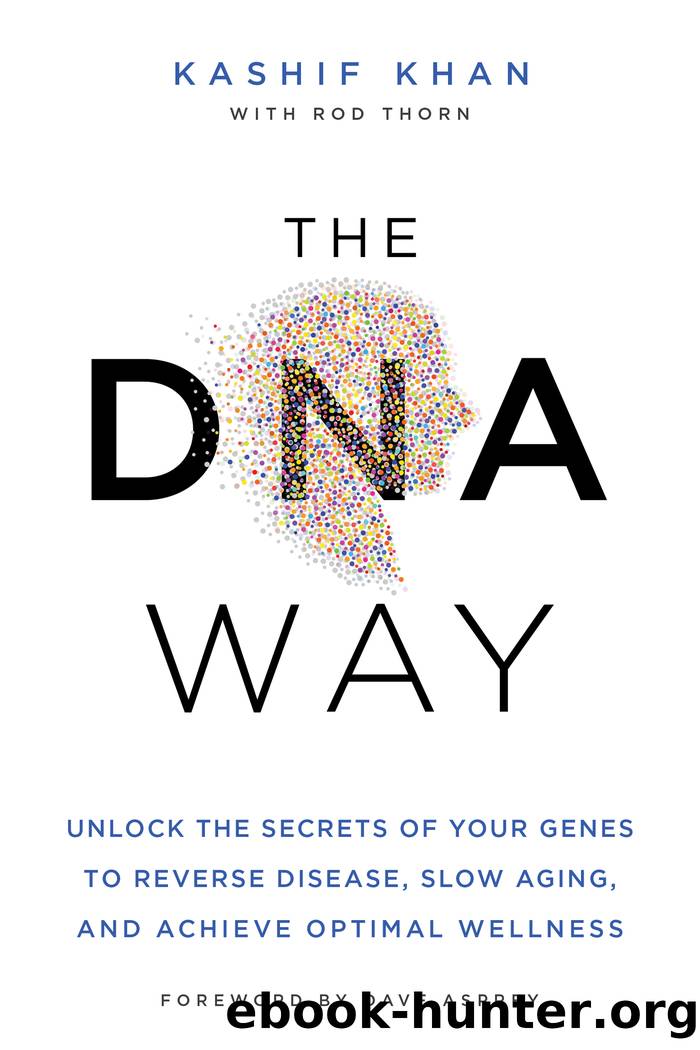The DNA Way by Kashif Khan & Dave Asprey

Author:Kashif Khan & Dave Asprey [Kashif Khan & Dave Asprey]
Language: eng
Format: epub
Publisher: Hay House
Published: 2023-02-17T00:00:00+00:00
Habits to Adopt
Slowly take out things from your diet one at a time.
Hold a family meeting to gain and gauge your familyâs support for sticking to a nutrient-dense, low-carbohydrate menu.
Host a taste test of non-wheat pastas to find out which ones you like.
Give up refined carbohydrates for one full day (just to try it and see).
Keep a food journal for a week to watch when cravings for carbohydrate-loaded and processed foods strike.
Purchase a meal subscription that focuses on low-carbohydrate meals.
Try low-carb or no-carb alternatives to satisfy your pasta cravings.
Put any processed/snack foods in a locked cabinet in the basement or attic.
Fill two-thirds of your plate with vegetables and nutrient-dense foods at every meal.
Plan your snacks ahead of time with pre-portioned amounts of nuts, vegetables, and other low-carbohydrate snacks.
Brush your teeth immediately after dinner each day.
Replace your rice and pasta with low-carb or no-carb options like cauliflower rice and shirataki noodles.
Eliminate packaged and processed foods that contain trans fats and high sodium: boxed cake mixes, store-bought cookies and pastries, microwavable frozen meals, foods listing âhydrogenatedâ or âpartially hydrogenated oilsâ on the ingredients list, like vegetable shortening and margarine.
Reduce your consumption of saturated fats (from animal meat and dairy). This is due to a suboptimal APOA2 gene.
Prioritize polyunsaturated fats (fats from plants), especially omega-3 fatty acids. Marine sources: algae, wild fatty fish such as anchovies, mackerel, sardines, salmon, and cod; plant sources of omega 3s: avocado oil, flaxseed oil, walnuts, flaxseeds, chia seeds, hemp seeds, edamame, seaweed.
When shopping, buy the low- or no-fat version of dairy products like yogurt and milk.
Wash and package vegetables for easy snacking when you go to your refrigerator.
Institute (or expand) a âmeatless Mondayâ plan for yourself or your family when you focus on replacing high-fat dairy or meat with vegetable alternatives like tofu, butternut squash, jackfruit, or beets.
Dedicate at least one day per week to perfecting a stir-fry or roasted vegetable recipe that you enjoy.
Buy an easy-to-eat option from the list of omega-3rich items: smoked salmon, sardines, roasted seaweed, guacamole (with flaxseed chips), etc.
Buy a book with microbiome-friendly recipes.
Rid your pantry and medicine cabinet of any toiletries or foods with preservatives, food colorings, and artificial sweeteners.
Talk to your doctor about reducing medications, if possible. If pregnant, discuss the benefits of vaginal birth.
Read up on the negative effects of antibiotics and understand their optimal (not reactive) use.
Purchase and taste test an array of fermented foods you donât regularly buy: kefir, krauts, kombucha, kimchi, etc.
Reduce any exposure to chemicals and pesticides in products ranging from cleaning products to toiletries, allowing exposure to healthy, natural environments.
Eat favorite prebiotics twice daily: chocolate with high percentage cacao, artichoke hearts, bananas, etc.
Walk in the dirt or grass barefoot for a few minutes each day.
Eat one type of fermented food each morning with your breakfast.
Download
This site does not store any files on its server. We only index and link to content provided by other sites. Please contact the content providers to delete copyright contents if any and email us, we'll remove relevant links or contents immediately.
Men In Love by Nancy Friday(5232)
Everything Happens for a Reason by Kate Bowler(4729)
The Immortal Life of Henrietta Lacks by Rebecca Skloot(4572)
Why We Sleep by Matthew Walker(4434)
The Sports Rules Book by Human Kinetics(4379)
Not a Diet Book by James Smith(3410)
The Emperor of All Maladies: A Biography of Cancer by Siddhartha Mukherjee(3144)
Sapiens and Homo Deus by Yuval Noah Harari(3062)
Day by Elie Wiesel(2779)
Angels in America by Tony Kushner(2652)
A Burst of Light by Audre Lorde(2597)
Endless Forms Most Beautiful by Sean B. Carroll(2473)
Hashimoto's Protocol by Izabella Wentz PharmD(2371)
Dirty Genes by Ben Lynch(2313)
Reservoir 13 by Jon McGregor(2300)
Wonder by R J Palacio(2203)
And the Band Played On by Randy Shilts(2197)
The Immune System Recovery Plan by Susan Blum(2057)
Stretching to Stay Young by Jessica Matthews(2036)
